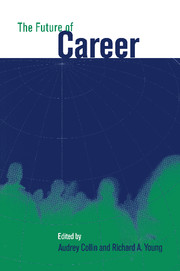Book contents
- Frontmatter
- Contents
- Notes on contributors
- Acknowledgements
- 1 Introduction: framing the future of career
- Part 1 Changing contexts
- Part 2 New perspectives
- Part 3 New directions for theory, practice and policy
- 12 Reconceptualising career theory and research: an action-theoretical perspective
- 13 A new perspective for counsellors: from career ideologies to empowerment through work and relationship practices
- 14 Adapting to the changing multicultural context of career
- 15 Managing careers in organisations
- 16 Learning for work: global causes, national standards, human relevance
- 17 The new career and public policy
- 18 The future of career
- Author index
- Subject index
13 - A new perspective for counsellors: from career ideologies to empowerment through work and relationship practices
Published online by Cambridge University Press: 06 January 2010
- Frontmatter
- Contents
- Notes on contributors
- Acknowledgements
- 1 Introduction: framing the future of career
- Part 1 Changing contexts
- Part 2 New perspectives
- Part 3 New directions for theory, practice and policy
- 12 Reconceptualising career theory and research: an action-theoretical perspective
- 13 A new perspective for counsellors: from career ideologies to empowerment through work and relationship practices
- 14 Adapting to the changing multicultural context of career
- 15 Managing careers in organisations
- 16 Learning for work: global causes, national standards, human relevance
- 17 The new career and public policy
- 18 The future of career
- Author index
- Subject index
Summary
This chapter is written in the context of the radical economic and social changes, particularly changes in paid work, presently occurring in the United States and the rest of the world that have been addressed in earlier chapters of this book. Rapid change, while stressful and anxiety-provoking, also provides unique opportunities to see more clearly the impact of the social system on individuals in that system. My contention in this chapter is that while the career-related practice of counselling professionals in the United States developed ostensibly to aid individuals or groups of individuals with choices, plans, and development with respect to paid work, it is influenced by associated career ideologies largely serving the needs of the economy.
The goal of this chapter is to open up a space for a reflexive consideration of how the professional practice of counselling can best serve the needs of people, rather than, or in addition to, the needs of the economy. I hope to encourage a more open dialogue between the needs and desires of people and the needs of the economy. This space will be constructed through a critical analysis of career ideologies and the development of amore person-sensitive perspective on the significance of work in people's lives. It is hoped that such a perspective will encourage a professional practice of counselling supportive of personal empowerment and sensitive to the needs of all groups in society rather than a practice overly dominated by the needs of the economy and the prevailing power distributions. While this analysis is based on experience in the United States, I hope it will prove useful to counselling practitioners in other cultural contexts.
- Type
- Chapter
- Information
- The Future of Career , pp. 197 - 211Publisher: Cambridge University PressPrint publication year: 2000
- 47
- Cited by

